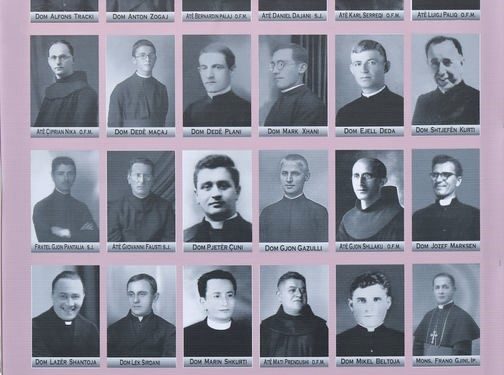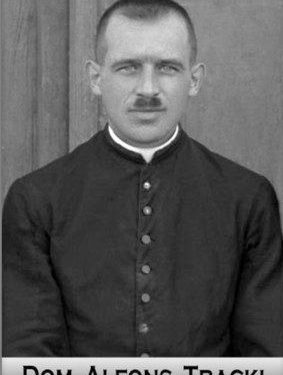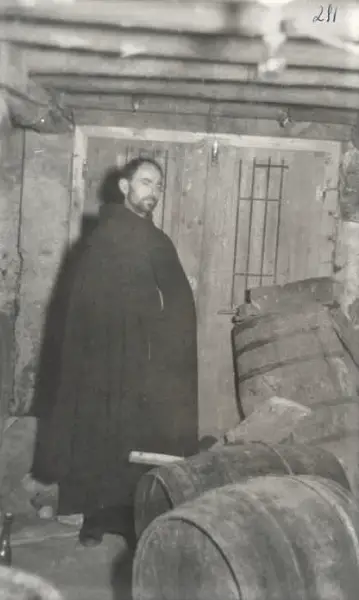By Gjovalin Lazri
Memorie.al / On July 18, 1946, before dawn, at 5 o’clock in the morning, the loud screams of the machine gun were heard, which at that time had become for us the signal of the disappearance of innocent people, frequent signals that had begun in recent times to wake us up with the feeling of horror, but also with that of pain. Just like in one breath, we left our homes, to the meeting point with our friends, running towards the Catholic Cemetery, next to the shale of the Kir River…!
In an article of the time, we learn that the anti-communist resistance forces, or as they were known differently, even as the National Rescue forces, who still lived in the mountains, approached him with all the possibilities of salvation, but Dom Alfonsi, refused to leave, being said:
“I have no reason to leave. I am completely out of politics, and the most important thing is that, in these moments, I have a very high religious mission, which I want to carry out with the greatest devotion. This man I have next to me is one of my dearest people. As you can see, he has not yet breathed his last.
I can never and in no way abandon it. Then, I have other, even bigger reasons. Know that I am also Albanian. I did not come here as a politician, I am neither a soldier nor a conqueror, but I am a priest, and if I have to die, I want to die as a priest”.
And, thus surrounded, he continued to the end his work with the wounded, performing the last services and honors, as the Catholic faith begs. With an admirable calmness and to the end proud, he did not hesitate to address the soldiers of the State Security, saying to them face to face: “You take me, here I am, you don’t have to organize for my capture, as look, and I’m also unarmed”.
In the most savage way and, with their rebellious nature, they dragged him to the terrible prisons, where for six months; he was subjected to the most inhuman tortures that can be done to a human being. After six months, in the “Rozafat” cinema of the city of Shkodra, they decided to put him on trial. A trial enough to shame him, discredit him and communicate the death penalty, because the purity of the moral and political figure of this exemplary priest had nothing to do with the colors of communist politics, or treason, as he invented the communist regime in power.
At the trial, Dom Alfonsi maintained a manly attitude. In the most solemn way, repeating to the communists the words he had said to them six months ago, at the time of his arrest, he also added the following:
“I’m really German, but Albania is my second homeland. I came to Albania as a priest, I acted as a priest, I want to die as a priest. As an honest citizen, I have declared and I declare again, the Nazi character of this unjust war, even though I have never been a politician”.
However, the executioners had fixed and recorded his punishment in time. When the judge sentenced him to death by firing squad, according to a formal custom of that time, he would ask him for his last wish. Dom Alfonsi, with a deep spiritual feeling, answers:
“My last request is that you allow my children to go out on the street tomorrow, so that I can see them for the last time.”
Surprisingly, this promise was kept. But it turned out later that even this promise was backfired. There was the possibility of eavesdropping and whispering by wicked people, as to who would appear at that meeting, but thanks to the fact that we were small, everything passed without danger. The next day of that day, at the time when the last session was to be held, on the way to the court, with the blessing of our parents, we went to the designated place, in front of the “Big Cafe”, where we would say goodbye for the last time. , with our unforgettable teacher. It was really an emotional meeting.
The first look in those short moments, in the eyes of both parties, had a very big meaning inside, there was a mountain of impressions and memories, among the most beautiful, but above all, there was longing, pain, and desire to talk, the pleasure of hugging, but that all melted away in a few seconds, leaving us frozen and confused, unable to open our mouths, even for a single word. Such a stupor, a person really rarely experiences in life.
With tears in our eyes, we went through this difficult but unforgettable moment, when we were finally parting from the most beloved person we had gained in life. A day later, on July 18, 1946, before dawn, at 5 o’clock in the morning, the loud screams of the machine gun were heard, which at that time, had become for us, the signal of the disappearance of innocent people, frequent signals that had recently begun to wake us up with a sense of horror, but also with that of pain.
As if in one breath, we left our houses to the meeting point with friends, running towards the Catholic Cemetery, near the shingle of the river Kir (at that time it was allowed to see, the sight of the shot). A stunning sight. Four men, four patriots, four innocents, four souls who are still looking for human gratitude: Dom Alfons Tracki, Kol Ashiku, Nikoll Preng Dodaj, and Kel Abati, were already dead.
A more painful sight could not be seen by man. Our priest had chosen his death in such a way, to be as close as possible to his spiritual world, in the arms of God, kneeling in the last prayers, with kissed hands where he had clenched his fists, with a forehead split by the bullets, from which blood was still flowing, this was a terrifying scene, which was filmed in our memory and in our soul, never to be unrecorded again.
In grave silence, so numb, we stayed for several minutes, tears streaming down our faces. As dull as we were, our eyes met with a pale and unknown face, from which came a broken voice as if coming from the bottom of the earth, a voice that was melancholic but held within it a great pain. The man as a shadow in the middle of that silence, with a deep emotion, suddenly released the blessing: “May the light bless your soul, rest in peace”.
Torn and killed spiritually, with an inner world weighed down as much as possible, we returned to our homes. For a long time, we lived mentally and spiritually this loss, as painful as it was unfair, the loss of this rare man, who throughout his life, thought and acted only to do well. From later writings, as well as from people who witnessed that macabre act, we will have recorded the last words of Dom Alfonsi: “Long live Christ the King”, and: “Forgive, O Lord that they do not know what they are doing”!
Of course, we couldn’t do anything that day, but after a few days, with a group of friends, with the opportunities we had, we gathered a bunch of flowers and, as soon as it caught our eye, we put them in the place where we thought the remains of Dom Alfonsi rested. , but time showed that those bones were lost forever, never to be found again.
The flow of the river Kir had carried them along the villages of Bardhej and Rrence, along with many other unfortunates, spreading everywhere the horror of the crime, but also the feeling of pain and human innocence.
At the end of this tribute, the question naturally arises: Should we act before it’s too late, so that one of the local cultural institutions bears the name of this outstanding personality? Memorie.al














